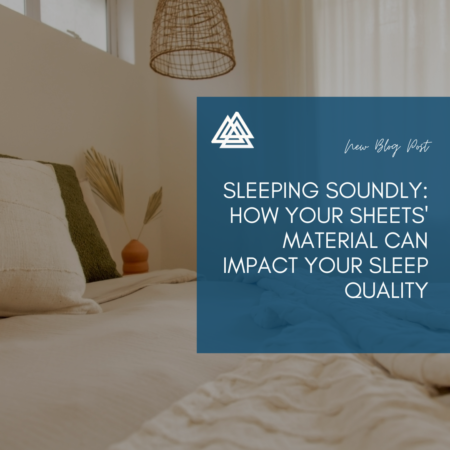 A good night’s sleep is essential for our physical and mental well-being, and while many factors contribute to restful slumber, the material of your bed sheets is often overlooked. The right sheets can make a significant difference in your comfort, temperature regulation, and overall sleep quality. This blog post explores how different sheet materials impact your sleep and offers tips for choosing the best ones for your needs.
A good night’s sleep is essential for our physical and mental well-being, and while many factors contribute to restful slumber, the material of your bed sheets is often overlooked. The right sheets can make a significant difference in your comfort, temperature regulation, and overall sleep quality. This blog post explores how different sheet materials impact your sleep and offers tips for choosing the best ones for your needs.
The Role of Sheets in Sleep Quality
When we think about improving sleep quality, we often focus on mattresses, pillows, and room ambiance. However, bed sheets play a crucial role in creating a comfortable sleep environment. The material of your sheets can affect:
- Temperature Regulation: Certain fabrics help maintain a comfortable body temperature by wicking away moisture and providing breathability.
- Comfort and Softness: The texture and softness of the material can influence how cozy and relaxed you feel in bed.
- Allergen Control: Some materials are better at repelling dust mites and other allergens, contributing to a healthier sleep environment.
Common Sheet Materials and Their Impact
Let’s explore some of the most common sheet materials and how they affect sleep quality:
1. Cotton
Pros:
- Breathability: Cotton is highly breathable, allowing air to circulate and keeping you cool during the night.
- Softness: High-quality cotton sheets, such as Egyptian or Pima cotton, are exceptionally soft and comfortable.
- Durability: Cotton sheets are durable and tend to get softer with each wash.
Cons:
- Wrinkling: Cotton sheets can wrinkle easily, which might be a concern for those who prefer a crisp, smooth look.
2. Linen
Pros:
- Temperature Regulation: Linen is excellent for temperature regulation, keeping you cool in the summer and warm in the winter.
- Hypoallergenic: Linen is naturally hypoallergenic and resistant to bacteria and fungi.
- Durability: Linen sheets are incredibly durable and can last for decades with proper care.
Cons:
- Texture: Linen can feel rough initially but softens over time with use and washing.
- Cost: Linen sheets are often more expensive than other types.
3. Silk
Pros:
- Softness and Luxury: Silk sheets are incredibly soft, smooth, and luxurious.
- Hypoallergenic: Silk naturally repels dust mites and other allergens.
- Temperature Regulation: Silk can help regulate body temperature, keeping you comfortable year-round.
Cons:
- Maintenance: Silk sheets require delicate care and are often dry clean only.
- Cost: Silk is one of the more expensive sheet materials.
4. Bamboo
Pros:
- Eco-Friendly: Bamboo is a sustainable resource, making bamboo sheets an environmentally friendly option.
- Softness: Bamboo sheets are soft and silky to the touch.
- Temperature Regulation: Bamboo is breathable and moisture-wicking, keeping you cool and dry.
Cons:
- Durability: Bamboo sheets can be less durable than other materials and may wear out more quickly with frequent use.
5. Microfiber
Pros:
- Affordability: Microfiber sheets are typically more affordable than natural fiber options.
- Softness: They are often very soft and smooth to the touch.
- Durability: Microfiber is durable and resistant to wrinkling and shrinking.
Cons:
- Breathability: Microfiber is less breathable than natural fibers, which can lead to overheating.
- Synthetic Feel: Some people may find the synthetic feel of microfiber less comfortable.
Tips for Choosing the Best Sheets
When selecting sheets, consider the following tips to ensure you choose the best material for your sleep needs:
- Evaluate Your Preferences: Consider your personal preferences for softness, warmth, and breathability. Think about whether you prefer the feel of natural or synthetic fibers.
- Consider Climate: Choose sheets that match your climate and seasonal needs. Breathable fabrics like cotton and linen are great for warmer climates, while silk and flannel can provide warmth in cooler weather.
- Check Thread Count: For cotton sheets, thread count can be an indicator of quality. However, higher thread counts are not always better. Aim for a thread count between 200 and 600 for a good balance of softness and durability.
- Look for Hypoallergenic Options: If you have allergies, opt for hypoallergenic materials like silk, bamboo, or specially treated cotton.
- Maintenance and Care: Consider how much effort you’re willing to put into caring for your sheets. Some materials, like silk and linen, require more delicate handling, while others, like microfiber, are low-maintenance.
The material of your bed sheets can significantly impact your sleep quality by influencing comfort, temperature regulation, and allergen control. By understanding the pros and cons of different sheet materials, you can make an informed choice that enhances your sleep environment. Prioritize your personal preferences and needs to find the perfect sheets that will help you sleep soundly and wake up refreshed. Remember, investing in high-quality sheets is an investment in your overall well-being.
